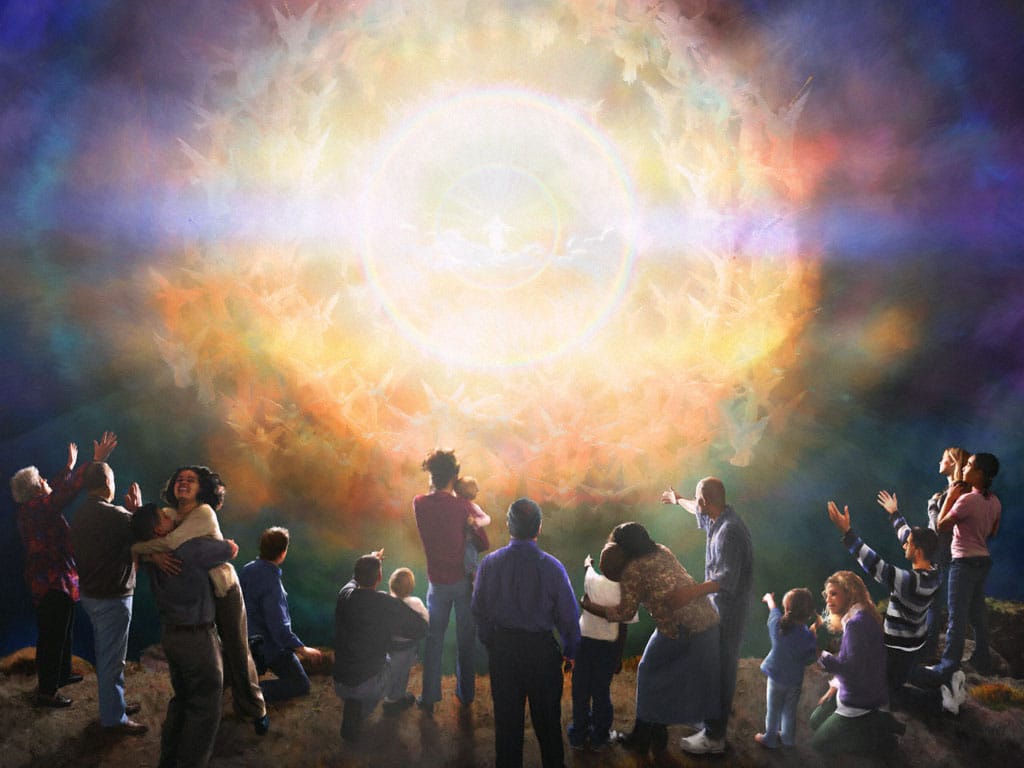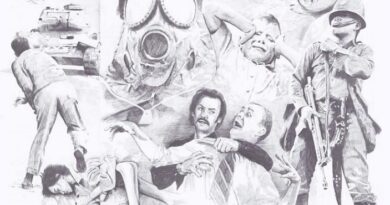
In Anticipation of Christ’s Return
The doctrine of the Second Coming teaches us that we do not and cannot know when the world drama will end. The curtain may be rung down at any moment:say, before you have finished reading this paragraph. This seems to some people intolerably frustrating. So many things would be interrupted. Perhaps you were going to get married next month, perhaps you were going to get a raise next week: you may be on the verge of a great scientific discovery; you may be maturing great social and political reforms. Surely no good and wise God would be so very unreasonable as to cut all this short? Not now, of all moments!
But we think thus because we keep on assuming that we know the play. We do not know the play. We do not even know whether we are in Act I or Act V. We do not know who are the major and who the minor characters. The Author knows. The audience, if there is an audience (if angels and archangels and all the company of heaven fill the pit and the stalls) may have an inkling. But we, never seeing the play from outside, never meeting any characters except the tiny minority who are “on” in the same scenes as ourselves, wholly ignorant of the future and very imperfectly informed about the past, cannot tell at what moment the end ought to come. That it will come when it ought, we may be sure; but we waste our time in guessing when that will be. That it has a meaning we may be sure, but we cannot see it. When it is over, we may be told. We are led to expect that the Author will have something to say to each of us on the part that each of us has played. The playing it well is what matters infinitely.
The doctrine of the Second Coming, then, is not to be rejected because it conflicts with our favorite modern mythology. It is, for that very reason, to be the more valued and made more frequently the subject of meditation. It is the medicine our condition especially needs.
And with that, I turn to the practical. There is a real difficulty in giving this doctrine the place which it ought to have in our Christian life without, at the same time, running a certain risk. The fear of that risk probably deters many teachers who accept the doctrine from saying very much about it.
We must admit at once that this doctrine has, in the past, led Christians into very great follies. Apparently many people find it difficult to believe in this great event without trying to guess its date, or even without accepting as a certainty the date that any quack or hysteric offers them. To write a history of all these exploded predictions would need a book, and a sad, sordid, tragic-comical book it would be. One such prediction was circulating when St. Paul wrote his second letter to the Thessalonians. Someone had told them that “the Day” was “at hand.” This was apparently having the result which such predictions usually have: people were idling and playing the busybody. One of the most famous predictions was that of poor William Miller in 1843. Miller (whom I take to have been an honest fanatic) dated the Second Coming to the year, the day, and the very minute. A timely comet fostered the delusion. Thousands waited for the Lord at midnight on March 21st, and went home to a late breakfast on the 22nd followed by the jeers of a drunkard.
Clearly, no one wishes to say anything that will reawaken such mass hysteria. We must never speak to simple, excitable people about “the Day” without emphasizing again and again the utter impossibility of prediction. We must try to show them that that impossibility is an essential part of the doctrine. If you do not believe our Lord’s words, why do you believe in his return at all? And if you do believe them must you not put away from you, utterly and forever, any hope of dating that return? His teaching on the subject quite clearly consisted of three propositions, (i) That he will certainly return. (2) That we cannot possibly find out when. (3) And that therefore we must always be ready for him.
Note the therefore. Precisely because we cannot predict the moment, we must be ready at all moments. Our Lord repeated this practical conclusion again and again; as if the promise of the Return had been made for the sake of this conclusion alone. Watch, watch, is the burden of his advice. I shall come like a thief. You will not, I most solemnly assure you you will not, see me approaching. If the householder had known at what time the burglar would arrive, he would have been ready for him. If the servant had known when his absent employer would come home, he would not have been found drunk in the kitchen. But they didn’t nor will you. Therefore you must be ready at all times.
The point is surely simple enough. The schoolboy does not know which part of his Virgil lesson he will be made to translate: that is why he must be prepared to translate any passage. The sentry does not know at what time an enemy will attack, or an officer inspect, his post: that is why he must keep awake all the time. The Return is wholly unpredictable. There will be wars and rumours of wars and all kinds of catastrophes, as there always are. Things will be, in that sense, normal, the hour before the heavens roll up like a scroll. You cannot guess it. If you could, one chief purpose for which it was foretold would be frustrated. And God’s purposes are not so easily frustrated as that. One’s ears should be closed against any future William Miller in advance. The folly of listening to him at all is almost equal to the folly of believing him. He couldn’t know what he pretends, or thinks, he knows.
Of this folly George MacDonald has written well “Do those”, he asks, “who say, Lo here or lo there are the signs of his coming, think to be too keen for him and spy his approach? When he tells them to watch lest he find them neglecting their work, they stare this way and that, and watch lest he should succeed in coming like a thief! Obedience is the one key of life.”
The doctrine of the Second Coming has failed, so far as we are concerned, if it does not make us realize that at every moment of every year in our lives Donne’s question “What if this present were the world’s last night?” is equally relevant.
Sometimes this question has been pressed upon our minds with the purpose of exciting fear. I do not think that is its right use. I am, indeed, far from agreeing with those who think all religious fear barbarous and degrading and demand that it should be banished from the spiritual life. Perfect love, we know, casteth out fear. But so do several other things ignorance, alcohol, passion, presumption, and stupidity. It is very desirable that we should all advance to that perfection of love in which we shall fear no longer; but it is very undesirable, until we have reached that stage, that we should allow any inferior agent to cast out our fear. The objection to any attempt at perpetual trepidation about the Second Coming is, in my view, quite a different one: namely, that it will certainly not succeed. Fear is an emotion: and it is quite impossible even physically impossible to maintain any emotion for very long. A perpetual excitement of hope about the Second Coming is impossible for the same reason. Crisis-feeling of any sort is essentially transitory. Feelings come and go, and when they come a good use can be made of them: they cannot be our regular spiritual diet.
What is important is not that we should always fear (or hope) about the End but that we should always remember, always take it into account. An analogy may here help. A man of seventy need not be always feeling (much less talking) about his approaching death: but a wise man of seventy should always take it into account. He would be foolish to embark on schemes which presuppose twenty more years of life: he would be criminally foolish not to make indeed, not to have made long since his will. Now, what death is to each man, the Second Coming is to the whole human race. We all believe, I suppose, that a man should “sit loose” to his own individual life, should remember how short, precarious, temporary, and provisional a thing it is; should never give all his heart to anything which will end when his life ends. What modern Christians find it harder to remember is that the whole life of humanity in this world is also precarious, temporary, provisional.
Any moralist will tell you that the personal triumph of an athlete or of a girl at a ball is transitory: the point is to remember that an empire or a civilization is also transitory. All achievements and triumphs, in so far as they are merely this-worldly achievements and triumphs, will come to nothing in the end. Most scientists here join hands with the theologians; the earth will not always be habitable. Man, though longer-lived than men, is equally mortal. The difference is that whereas the scientists expect only a slow decay from within, we reckon with sudden interruption from without at any no moment. (“What if this present were the world’s last night?”)
Taken by themselves, these considerations might seem to invite a relaxation of our efforts for the good of posterity: but if we remember that what may be upon us at any moment is not merely an End but a Judgment, they should have no such result. They may, and should, correct the tendency of some moderns to talk as though duties to posterity were the only duties we had. I can imagine no man who will look with more horror on the End than a conscientious revolutionary who has, in a sense sincerely, been justifying cruelties and injustices inflicted on millions of his contemporaries by the benefits which he hopes to confer on future generations: generations who, as one terrible moment now reveals to him, were never going to exist. Then he will see the massacres, the faked trials, the deportations, to be all ineffaceably real, an essential part, his part, in the drama that has just ended: while the future Utopia had never been anything but a fantasy.
Frantic administration of panaceas to the world is certainly discouraged by the reflection that “this present” might be “the world’s last night”; sober work for the future, within the limits of ordinary morality and prudence, is not. For what comes is Judgment: happy are those whom it finds labouring in their vocations, whether they were merely going out to feed the pigs or laying good plans to deliver humanity a hundred years hence from some great evil. The curtain has indeed now fallen. Those pigs will never in fact be fed, the great campaign against White Slavery or Governmental Tyranny will never in fact proceed to victory. No matter; you were at your post when the Inspection came.
Our ancestors had a habit of using the word “judgment” in this context as if it meant simply “punishment”: hence the popular expression, “It’s a judgment on him.*’ I believe we can sometimes render the thing more vivid to ourselves by taking judgment in a stricter sense: not as the sentence or award, but as the Verdict. Some day (and “What if this present were the world’s last night?”) an absolutely correct verdict if you like, a perfect critique will be passed on what each of us is.
We have all encountered judgments or verdicts on ourselves in this life. Every now and then we discover what our fellow creatures really think of us. I don’t of course mean what they tell us to our faces: that we usually have to discount. I am thinking of what we sometimes overhear by accident or of the opinions about us which our neighbors or employees or subordinates unknowingly reveal in their actions: and of the terrible, or lovely, judgments artlessly betrayed by children or even animals. Such discoveries can be the bitterest or sweetest experiences we have. But of course both the bitter and the sweet are limited by our doubt as to the wisdom of those who judge. We always hope that those who so clearly think us cowards or bullies are ignorant and malicious; we always fear that those who trust us or admire us are misled by partiality. I suppose the experience of the Final Judgment (which may break in upon us at any moment) will be like these little experiences, but magnified to the Nth.
For it will be infallible judgment. If it is favorable we shall have no fear, if unfavorable, no hope, that it is wrong. We shall not only believe, we shall know, know beyond doubt in every fibre of our appalled or delighted being, that as the Judge has said, so we are: neither more nor less nor other. We shall perhaps even realize that in some dim fashion we could have known it all along. We shall know and all creation will know too: our ancestors, our parents, our wives or husbands, our children. The unanswerable and (by then) self-evident truth about each will be known to all.
I do not find that pictures of physical catastrophe that sign in the clouds, those heavens rolled up like a scroll help one so much as the naked idea of Judgment. We cannot always be excited. We can, perhaps, train ourselves to ask more and more often how the thing which we are saying or doing (or failing to do) at each moment will look when the irresistible light streams in upon it; that light which is so different from the light of this world and yet, even now, we know just enough of it to take it into account. Women sometimes have the problem of trying to judge by artificial light how a dress will look by daylight. That is very like the problem of all of us: to dress our souls not for the electric lights of the present world but for the daylight of the next. The good dress is the one that will face that light. For that light will last longer.
________
Source: The World’s Last Night and Other Essays (Harcourt, Brace and Company – New York, USA, 1959 edition), pp. 105-113


